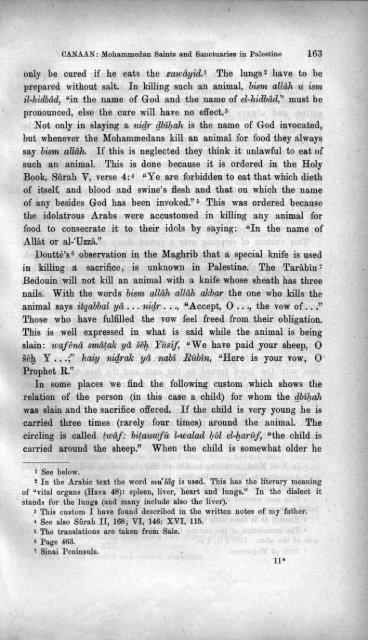Mohammedan saints and sanctuaries in Palestine
Create successful ePaper yourself
Turn your PDF publications into a flip-book with our unique Google optimized e-Paper software.
CANA..A.N : <strong>Mohammedan</strong> Sa<strong>in</strong>ts <strong>and</strong> Sanctuaries <strong>in</strong> Palest<strong>in</strong>e 163<br />
only be cured if he eats ·the zawilyid. 1 The lung~2 'have to be<br />
prepared without salt. In kill<strong>in</strong>g such an animal, biem allilh 1.£ ism<br />
il-hidbild, "<strong>in</strong> the name of God <strong>and</strong> the name of el-hidbild," must be<br />
pronounced, else the cure will have no effect."<br />
Not only <strong>in</strong> slay<strong>in</strong>g a niqr qb1,l,tah is the name of God <strong>in</strong>vocated,<br />
but whenever the <strong>Mohammedan</strong>s kill an animal for food-they always<br />
say bism allah. If this is neglected they 'th<strong>in</strong>k it unlawful to eat of<br />
such an animal. 'This is done because it is ordered <strong>in</strong> the Holy<br />
Book, Surah V, verse 4: 4 "Ye are forbidden to eat that which dieth<br />
of itself, <strong>and</strong> blood <strong>and</strong> sw<strong>in</strong>e's flesh <strong>and</strong> that on which the name<br />
of any besides God has been <strong>in</strong>voked." S This was ordered because<br />
the idolatrous Arabs were accustomed <strong>in</strong> kill<strong>in</strong>g any animal for<br />
food to consecrate it to their idols by say<strong>in</strong>g: "In the name of<br />
'AllM or al-'Uzza."<br />
Doutte's 6 observation <strong>in</strong> the Maghrib that a special knife is used<br />
<strong>in</strong> kill<strong>in</strong>g li sacrifice, is unknown <strong>in</strong> Palest<strong>in</strong>e. The Tarab<strong>in</strong> 'i<br />
Bedou<strong>in</strong> will not kill an animal with a knife whose sheath has three<br />
nails. With the words bism allilh allilh akbar the one who kills the<br />
animal says itqabbal yil . .. niqr ..., "Accept, 0 ..., the vow of ..."<br />
Those who have fulfilled the vow feel freed from their obligation.<br />
This is well expressed <strong>in</strong> what is said while' the animal is be<strong>in</strong>g<br />
sla<strong>in</strong>: wafenil slliatak ya sel] Y usif, "We have paid your sheep, 0<br />
sel} Y ...i" haiy niq1'ak ya . nabi R ftb<strong>in</strong>, "H ere is your vow, 0 '<br />
Prophet R." .<br />
In some places we f<strong>in</strong>d the follow<strong>in</strong>g custom which shows the<br />
relation of the person (<strong>in</strong> this case a child) for whom' the qbil,tah<br />
was sla<strong>in</strong> <strong>and</strong> the sacrifice offered. If the child is very young he' is<br />
carried three times (rarely four times) around 'the animal. The<br />
circl<strong>in</strong>g is called twaf : bitauwfu l-uialad Ml el-l]arfiJ, "the child is<br />
carried around the sheep." When the child is somewhat older he<br />
I<br />
See below.<br />
2 I n the Arabic text the word mu' liiq is used. This has the literary mean<strong>in</strong>g<br />
of "vital organs (Ha va 48): spleen, liver, heart <strong>and</strong> lungs." In the dialect it<br />
, st<strong>and</strong>s for th e lun gs (<strong>and</strong> many <strong>in</strong>clude also the liver).<br />
3 This custom I have found described <strong>in</strong> the wri tten note s of my ' fath er.<br />
4 See also Sfirah Il, 168; VI, 146: XVI, 115.<br />
~ The tran slations are taken from Sale.<br />
6 Page 463.<br />
7 S<strong>in</strong>ai P en<strong>in</strong>sula.<br />
11*



